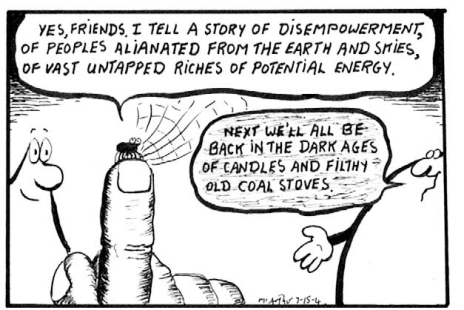
“Indeed,” says The Meter Reader,” the spider teaches us that this technology is not used by the people. It is not part of their daily lives as is the telephone, TV and computer. It does not link their home appliances and generators to the grid in intelligent manner so they can profit from the waxing and waning of the flows of electrons in the wires criss-crossing the land.”

JOURNEY index Look back to 3 Next -Ready to Make the Big Connection
Teachers: The owner of the meter board plays a potent role in dictating the content of the education curricula. As gas and oil reserves diminish, this role will increase.
How we design our homes and electric appliances is very much dictated by our ability to interact intelligently with the main grid. Similarly, students’ perceptions of their ability to use energy forms is limited by the technologies they see in their homes. The curriculum is very much defined by the absence of resources.
In this case, students have little opportunity to experience simple, safe technology that links local electricity generation to the grid and understand how “distributed generation” works. The meter-switch board is not merely ignored in the extramural curriculum. Students are taught it is a dangerous zone and to be avoided.
The recent electricity reforms of the 1990s, in which energy itself was redefined as grid-sourced electricity, have worsened this situation.
For most of last century the citizens in New Zealand owned the metering and response technologies on their switchboards through their local communities. (60 communities in all in a population growing from 1 to 3.5 million people). The so-called Market Reforms of the industry effectively removed their right and ability to own the technology. In 2004 , the majority of it is now owned by a gas conglomerate (AGL- the Australian Gas Light Co and its bankers). Even the traditional technology enabling communities and households to adapt heating use so as to benefit from reduced demand on the main-grid has been downgraded.
This has profound implications for the teaching of civics, politics, history, geography and environmental studies at all levels. Effectively the switch-board is the common market place and now its trade is dominated by a few individuals in one company. Indeed there is a good argument that the “Market Reforms” demolished the true electricity market.
In terms of the environment, the individual’s ability to moderate peak grid loads affects the design and use of bulk-electricity generators. For example a gas conglomerate can make maximum profits at times of the peak grid-load and it works to their principal shareholder’s advantage if they can control and manipulate peak load factors.
The content of the taught curriculum is also affected more directly. Community-generated Environmental Education resources, born of and driven by a local-service ethic, have been replaced with private corporation-generated resources, born of and driven by a select-profit ethic.
For more insight into how the process works, check out the Seminar to NZAEE June 6 2004 via the site Welcome Page in the Energy Gobbledegook section.
Chapter Seven - The House of Life - The Spider's Tale.
Bonus Joules and the Knowledge Economy: All images on this site are copyright.